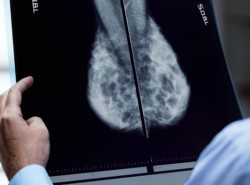
Understanding the collective influence of genetic variants on breast cancer risk
Published: 04/30/24 8:27 AM

Paul James
Project Description:
Only 18% of hereditary breast cancer can be explained by a single genetic variation, like that in the well-known high-risk BRCA1 gene. However, over 300 genetic variants associated with breast cancer risk have been discovered. Although single genetic variants may present a minor impact on breast cancer risk, a combination of genetic variants, measured as a polygenic risk score could confer a significant risk. Women with a high polygenic risk score are three times more likely to develop breast cancer. In this NBCF-funded study the team aims to define the biological mechanisms by which a high polygenic risk score promotes cancer development whereas a low polygenic risk score provides protection.
Why is this work needed:
The discovery of genetic variations in genes like BRCA1 and BRCA2 have led to landmark discoveries in understanding the causes of hereditary breast cancer and supporting clinical care for breast cancer patients. However, these findings only apply to a small number of women. Hundreds of genetic variants have now been discovered to be associated with breast cancer risk. A combination of genetic variants that can provide a measure of the risk of developing breast cancer has the potential to inform early intervention and reduce the impact of this disease within a larger number of individuals at risk of breast cancer.
Expected outcomes:
Successful outcomes of this study will provide a better understanding of how collectively genetic variants function to modify breast cancer risk. The knowledge gained will help to accelerate the use of the polygenic risk score as a critical tool to accurately evaluate the risk of developing breast cancer. Moreover, the outcomes may uncover therapeutic targetable key molecular pathways and pave the way for innovative therapeutic interventions.
Project description:
Examining the genetic factors linked to breast cancer has provided opportunities for better screening, cancer prevention, and improved care. However, this personalised approach is currently only applicable to a small number of individuals who carry a genetic variation in a specific single high-risk gene such as BRCA1. Compelling research findings have identified hundreds of genetic variants. While on their own, these genetic variants only present a minor impact on the risk of developing breast cancer, a combination of these variants measured by a polygenic risk score can be clinically significant. Women with a high polygenic score have three times the risk of developing breast cancer.
In this NBCF-funded study Prof Paul James and colleagues from the Peter MacCallum Cancer Centre, aim to define the biological mechanisms by which a high polygenic risk score promotes cancer development and a low polygenic risk score provides protection. From a cohort of women with known high, and those with average polygenic risk scores, blood samples will be obtained, and laboratory cell culture models generated. These cell models will be examined to identify key molecular pathways that differ between the two with the aim to identify the key pathways that protect against breast cancer.
The knowledge generated will help to accelerate translation of the polygenic risk score as a major tool for effective risk assessment, reveal the basis for some individual’s intrinsic risk of breast cancer and open-up new pathways for therapeutic intervention.